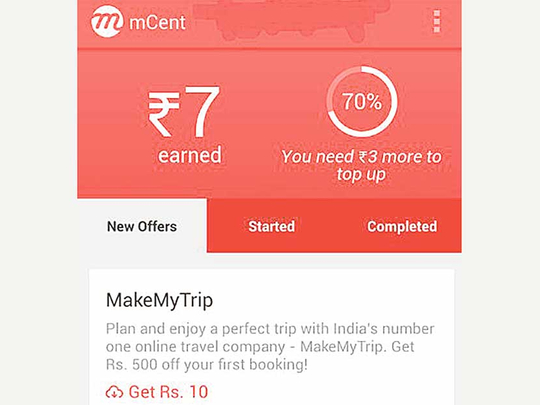
San Francisco: A start-up is quietly challenging Facebook’s efforts to connect emerging market consumers to the internet, signing up more than 15 times more telecoms operators than the high-profile effort led by the social network.
mCent, an app owned by Boston-based start-up Jana, has integrated with 311 operators, compared with Facebook-owned Internet.org’s partnerships with 20 operators. The app boasts 30 million users after the first year, as it makes internet access more widely available and affordable in developing countries.
One in 10 Android phone owners in India uses mCent and Jana has turned its focus to expanding in China, Brazil and Indonesia. The 60-person start-up gives users free data in return for trying the apps of its advertisers, which include Twitter, Amazon and Tencent. The company credits the users’ accounts with enough data for the app and one more after they use it for more than a week.
Nathan Eagle, co-founder and chief executive, said increasing numbers of poor people have smartphones as the prices of such devices have fallen but the cost of data can eat up to an average of 10 per cent of an emerging market subscriber’s daily wage. Telecoms companies struggle to get more money from these users, while the subscribers suffer because their internet access is restricted.
“Ultimately the value proposition is free connectivity and that is universally appealing. Across cultures and across continents, people want to spend less money on their phone bill,” he said.
Jana, which has raised $40 million (Dh146.8 million) from Spark Capital, the venture capital firm, and advertising group Publicis, takes a different tack to Internet.org, the Facebook-led initiative which includes participation from companies such as Samsung and Qualcomm.
Internet.org is known for its plans to build drones and develop lasers that can beam down internet access from the sky to the most remote corners of the world. A full-scale version of Aquila, the high-altitude, long-endurance aircraft designed by a UK-based team and acquired by Facebook, is ready for flight testing.
But the majority of its efforts to connect people are focused on those who live within reach of the internet and cannot afford it. Internet.org has developed free-to-use apps across 18 countries which offer Facebook, alongside other sites including Google and the BBC, depending on the app. The offering will also provide access to information about basic government and healthcare services.
The Internet.org apps are launched in conjunction with telecoms operators, which receive no money for the data used but see it as a way to encourage people to understand the benefits of the internet and access data-rich services outside of the app.
Eagle said Internet.org’s “walled garden” approach made it an “inferior product” to mCent, on which people can use the data they earn by trying sponsored apps to go anywhere online. “I don’t see how they are going to scale unless they figure out a way to cover the cost,” he said, adding that Jana had sent tens of millions of dollars to operators.
He hit upon the idea for mCent when on sabbatical from his job as a visiting assistant professor at Massachusetts Institute of Technology, studying telecoms data. Looking at how to encourage nurses to send text messages when their blood banks were running low, he realised that asking them to do so was effectively forcing them to take a pay cut.
So he introduced a system that would allow the ministry of health to reimburse the cost of the SMS plus “a penny to say thank you”.
Now, he is eager for a larger slice of the emerging market advertising market, which he estimates will be worth more than $300 billion by 2019, citing research by eMarketer and ZenithOptimedia. He sees his competitors as “TV channels in Delhi, billboards in Sao Paulo and radio stations in Jaragar”, rather than alternative digital services.
“Ultimately our mission is to get 1 billion people free internet access and take a pretty substantial fraction of the $300 billion spent on advertising in the developing world,” he said.
Jana was Publicis’s first investment made outside its joint investing venture with France’s Orange.
Rishad Tobaccowala, chief strategist at the French advertising group, said the company was benefiting from San Francisco-based start-ups rushing to recruit new users in emerging markets. He said companies such as ride-hailing app Uber, which is pouring money into India and China as it takes on local rivals, are “a particularly valuable subset of marketers”.
But he added that consumer packaged goods companies such as Unilever, which has already lured people to buy shampoo packets with the promise of free data on the platform, are also potential advertisers.
Tobaccowala believes efforts to connect populations to the internet by big technology companies, which include Google’s Loon project to beam down the internet from balloons, could be sidelined by Jana. “Internet.org is a tenth the size of what Jana is, and as it goes into more and more markets - who needs Internet.org? Who needs Google Loon?”
Financial Times









